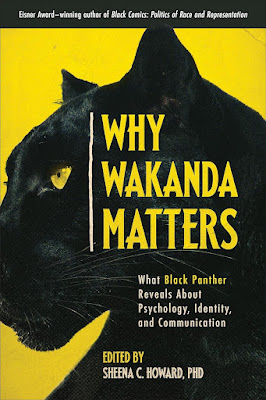I am a huge comic book fan. One of the things I love about comics is our ability to learn lessons in multi color action stories. I get why a lot of people don’t like the rude and crude Deadpool. But if you read some of the best Deadpool comics(like Gerry Duggan and Joe Kelly) you find lessons that readers can learn about self-worth, friendship, grieving, self-care and so much more. Many of these great stories and their lessons have been translated onto the screen in the Marvel Cinematic Universe. Audiences worldwide learned that superheroes can help teach lessons through many of these movies, with one of the most impactful being Black Panther.
Why Wakanda Matters: What Black Panther Reveals About Psychology, Identity, and Communication edited by Dr. Sheena C. Howard is a collection of academic articles discussing the impact of Black Panther on audiences and the general population. A common theme in the book is the power of a movie starring and made by a cast and crew of people of color. The movie seeks to avoid and overcome stereotypes found in the media. By not falling into the expected movie tropes for people of color, it communicates messages to young people about the roles that they can take within society. Additionally, it helps to combat the impact of stereotypes found in media.
I won’t go into the essays in-depth as they are many varied in their messages and themes. The big messages that I see are first and foremost, representation matters. Ryan Coogler and crew when creating the world of Wakanda intentionally built a world that audiences saw as important models for what people of color could be, with the movie showing scientists, soldiers, and kings as just a few of the many options open for futures. This world-building moved beyond stereotypes and generalizations, which often are used in film when creating for broad audiences. Another theme is while all authors agree that the representation in the film is impactful, they may disagree with the messages that the movie projects. For example, some writers see T’Challa’s final choices as conforming to long-term imperialistic and disempowering frameworks. But Killmonger’s strategies challenge the status quo and can be at times applauded. As one reads, you can tell that the authors as a group are very conflicted by the image of Killmonger who they applaud and criticize for his over-the-top aggressive choices…much like the movie-going audience.
Why Wakanda Matters is an academic work, and likely not for every reader with its heavy focus on theory and research. But I think it is more accessible than many academic works because the examples are often ones we know from viewing Black Panther. With it being a work that delves into many cognitive theories, I can also see readers who do not agree with everything written. Let’s be honest, this book talks about a charged issue with race. But, I also do not believe that the authors fully agree with each other, and Howard does a great job of bringing multiple perspectives together.
Why Wakanda Matters: What Black Panther Reveals About Psychology, Identity, and Communication edited by Dr. Sheena C. Howard is an academic collection that makes you think about race, representation, and portrayals of people of color in media. It helps to teach the importance of our stories, even when super, in teaching us important social and cultural lessons about how we interact and treat each other. For comic book fans, I think it is a great collection for understanding the power of comic characters. And for media fans, it demonstrates the power of story. I think it is definitely worth the read for Marvel…and DC…fans.
This post contains affiliate links, which means that Between Disney receives a percentage of sales purchased through links on this site.

No comments:
Post a Comment